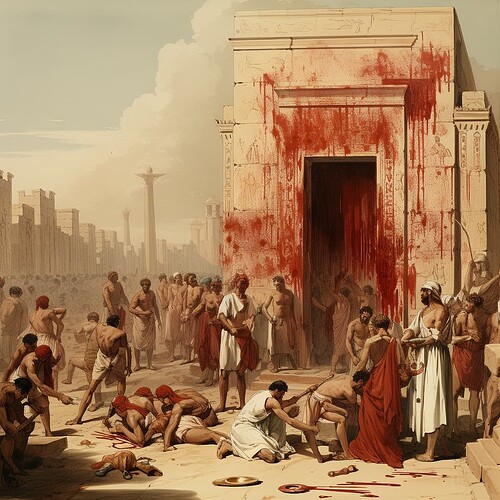![]() Introduction: The momentous chapter of Exodus 11,12 takes us through the last devastating plague to strike Egypt - the death of the firstborn, culminating in Pharaoh finally liberating the Israelites.
Introduction: The momentous chapter of Exodus 11,12 takes us through the last devastating plague to strike Egypt - the death of the firstborn, culminating in Pharaoh finally liberating the Israelites.
![]() Exodus 11: The Final Plague
Exodus 11: The Final Plague
God declares His final act of judgement on Egypt. The firstborn in every home, including Pharaoh’s, would die, demonstrating God’s inexorable power to Pharaoh.
![]() Key Verse: Exodus 11:5: “Every firstborn son in Egypt will die, from the firstborn son of Pharaoh, who sits on the throne, to the firstborn son of the female slave, who is at her hand mill.”
Key Verse: Exodus 11:5: “Every firstborn son in Egypt will die, from the firstborn son of Pharaoh, who sits on the throne, to the firstborn son of the female slave, who is at her hand mill.”
![]() Exodus 12: The First Passover
Exodus 12: The First Passover
The establishment of the Passover commemorated their deliverance and is the cornerstone of Jewish religious calendar.
![]() Key Verse: Exodus 12:14: “This is a day you are to commemorate; for the generations to come you shall celebrate it as a festival to the LORD—a lasting ordinance.”
Key Verse: Exodus 12:14: “This is a day you are to commemorate; for the generations to come you shall celebrate it as a festival to the LORD—a lasting ordinance.”
![]() Key Themes and Reflections:
Key Themes and Reflections:
- God’s Judgement and Mercy: God’s final plague was severe, yet it was His means of liberating His people. It teaches us that God’s methods might be beyond our understanding, but they are just.
- Symbolism of Passover Lamb: The lamb’s blood on the doors spared the Israelites, portraying Jesus in the New Testament as the ultimate sacrificial Passover Lamb.
![]() Today’s Application: The Passover reminds us of our deliverance from the bondage of sin through Christ, our Passover Lamb. We should always commemorate the sacrifice of Jesus, who took our sins upon Himself.
Today’s Application: The Passover reminds us of our deliverance from the bondage of sin through Christ, our Passover Lamb. We should always commemorate the sacrifice of Jesus, who took our sins upon Himself.
![]() Hidden Gem: The meticulous instructions for the Passover meal hint at a God who cares about details. Nothing in God’s world is too insignificant for His attention.
Hidden Gem: The meticulous instructions for the Passover meal hint at a God who cares about details. Nothing in God’s world is too insignificant for His attention.
![]() Reflective Q&A:
Reflective Q&A:
![]() What is the significance of the Passover?
What is the significance of the Passover?
A: It symbolizes God’s deliverance and is a foreshadowing of Christ’s sacrificial death for our liberation from sin.
![]() How does the final plague translate into our lives today?
How does the final plague translate into our lives today?
A: It reminds us of the severity of God’s judgement against sin and His deep love for us that He would provide an escape through the blood of Jesus.
![]() Join the Discussion: How do you celebrate and remember the sacrifice Christ made for you?
Join the Discussion: How do you celebrate and remember the sacrifice Christ made for you?
![]() See You Tomorrow in Exodus 13, 14: The journey of the Israelites continues as God leads them to the Promised Land, testing their faith every step of the way. Remember, just as God guided them, He also guides us in our everyday life through the uncharted territories.
See You Tomorrow in Exodus 13, 14: The journey of the Israelites continues as God leads them to the Promised Land, testing their faith every step of the way. Remember, just as God guided them, He also guides us in our everyday life through the uncharted territories.
 Subscribe to our newsletter
Subscribe to our newsletter
Subscribe to our newsletter at newsletter.aignitescripture.com for daily readings and exclusive content.
From thoughtful reflections to community highlights, get everything delivered straight to your inbox. Secure your spot today and be a part of our growing community!
